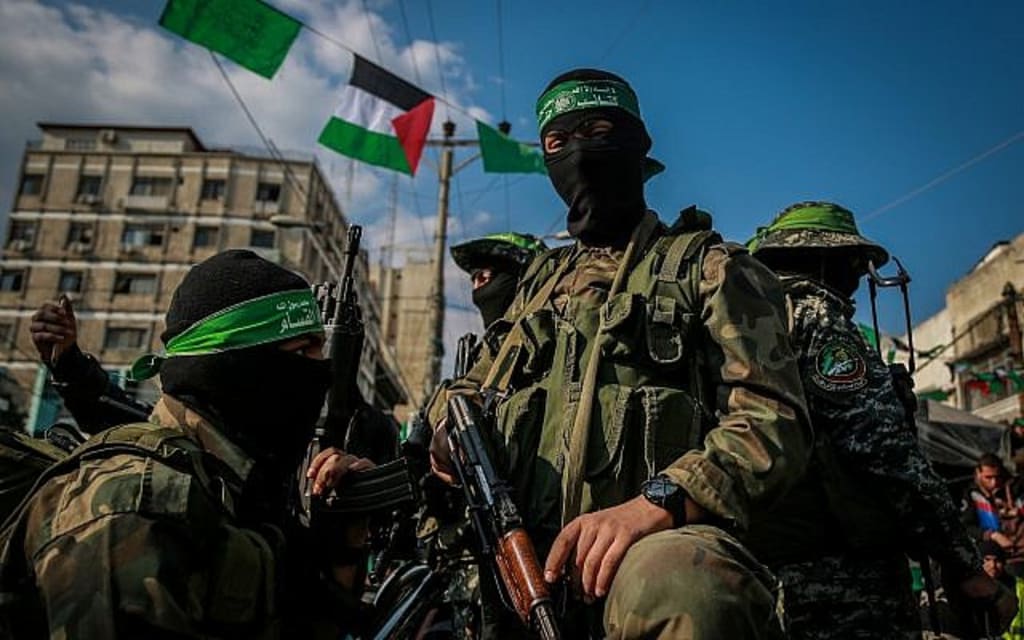"Hamas in Palestine: A Resilient Force in the Struggle for Sovereignty"
"From Resistance to Governance, Unraveling the Complex Tapestry of Hamas's Impact on the Israeli-Palestinian Landscape"

Hamas, an acronym for Harakat al-Muqawama al-Islamiyya (Islamic Resistance Movement), emerged in the late 1980s in the context of the Israeli-Palestinian conflict. Its roots can be traced back to the First Intifada, a Palestinian uprising against Israeli occupation that began in 1987.
Hamas was officially founded in 1987 by Sheikh Ahmed Yassin and other Palestinian activists with the goal of resisting Israeli occupation and establishing an Islamic state in historic Palestine. The organization gained support among Palestinians, particularly in the Gaza Strip and the West Bank, due to its social services and its perceived commitment to resistance against Israeli forces.
Hamas's ideology combines nationalist and Islamist elements, emphasizing both Palestinian self-determination and the establishment of an Islamic state. The group's charter, published in 1988, outlines its core principles, including the rejection of the State of Israel and its commitment to armed resistance.
Throughout the 1990s, Hamas carried out numerous suicide bombings and other attacks against Israeli civilians and military targets. This led to clashes with the Israeli military and contributed to a cycle of violence in the region. The group's military wing, the Izz ad-Din al-Qassam Brigades, became known for its involvement in armed resistance.
Hamas's political and military activities have been a source of contention. While some Palestinians view the group as a legitimate resistance movement, others criticize its use of violence and tactics that target civilians. The international community, including the United States and the European Union, has designated Hamas as a terrorist organization.
In 2006, Hamas won a majority in the Palestinian legislative elections, leading to its control of the Palestinian Authority. This resulted in increased tensions with the rival Fatah faction, which controlled the West Bank. In 2007, clashes between Fatah and Hamas escalated, leading to the ousting of Fatah from Gaza and the establishment of separate administrations in the West Bank and Gaza.
Since then, Hamas has maintained control over the Gaza Strip, while the West Bank remains under the jurisdiction of the Palestinian Authority. Efforts to reconcile the two factions and establish a unified Palestinian government have faced significant challenges.
Hamas's role in the Israeli-Palestinian conflict continues to shape the geopolitical landscape of the region, with the group engaging in periodic conflicts with Israel and facing international scrutiny for its tactics and objectives.
In the years following its takeover of Gaza, Hamas faced economic and political challenges. The blockade imposed by Israel and Egypt severely restricted the flow of goods and people in and out of the Gaza Strip, contributing to economic hardship and high unemployment rates. The political isolation of Hamas by the international community further compounded these challenges.
The conflict between Hamas and Israel has erupted into several military confrontations, notably in 2008-2009, 2012, and 2014. These conflicts resulted in significant civilian casualties and infrastructure damage in Gaza. The international community has often condemned both sides for human rights violations, including accusations against Hamas for its use of rocket attacks on civilian areas in Israel.
Hamas's relationship with other regional actors has evolved over time. While the group has received support from Iran and some other Islamist movements, its ties with certain Arab states have been fluid, influenced by shifting regional dynamics.
Efforts to achieve a lasting resolution to the Israeli-Palestinian conflict have involved negotiations, brokered by various international actors, but progress has been slow and challenging. The question of Hamas's participation in peace talks has been a major obstacle, as its refusal to recognize Israel and renounce violence goes against the principles set by the international community.
Hamas's governance in Gaza has been marked by a combination of security measures, social services, and attempts at economic development. However, the group's rule has faced internal criticism, with some Palestinians expressing dissatisfaction with issues such as governance, human rights, and freedom of expression.
In recent years, there have been sporadic attempts at reconciliation between Fatah and Hamas. Various agreements have been brokered, but the implementation has been elusive, and the divide between the West Bank and Gaza persists.
The situation remains complex and dynamic, with the Israeli-Palestinian conflict deeply intertwined with broader regional geopolitical dynamics. The role of Hamas in this context continues to be a subject of debate and contention, reflecting the complex challenges facing efforts to achieve a comprehensive and lasting resolution to the longstanding conflict in the region.
About the Creator
Danielle Steel
Professional Writer






Comments
There are no comments for this story
Be the first to respond and start the conversation.